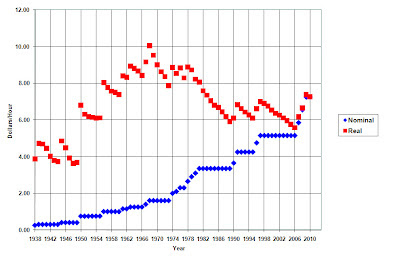We are in a period of extreme income inequality. It seems to be growing with no end in sight. Employers have unlimited power to drive wages lower as long as there is an abundance of labor. For the lowest level of worker that seems to be the permanent state. The only real floor to wages is whatever minimum wage is in place in the given location.
The history of the federal minimum wage is shown in this chart provided by Oregon State University:
The federal level of $7.25 per hour is exceeded by levels mandated by law in several states.
Whenever the subject of raising the minimum wage arises the counter arguments focus on lost jobs and diminishing US competitiveness in global markets. The state of Washington has a minimum wage of about $9 per hour. It does not seem to have suffered much from imposing that significantly higher level.
Why not get real serious and go for a $12 an hour minimum wage? Why that number? Because a study of the effect of such a change on our nation’s largest employer has already been performed. The Center for Labor Research and Education at the University of California at Berkeley has produced a report estimating the effect of a $12 minimum wage on Walmart’s workforce. Consider the following table covering the company’s US activities:
A $12 minimum would add about $3 billion in labor costs per year. If Walmart was to pass that cost on to its customers, the shoppers would see a net increase in price of 1.1%. Since Walmart’s competitors would also face the same wage requirement, there should be no change in competitiveness. A change of 1.1% is trivial; the world is not going to come to an end.
US exports tend to be high-end products where labor costs are a small fraction of the total, or they are high wage activities. There is not likely to be a significant effect on our trade balance.
Most of the jobs affected will be in service industries. These are jobs that will not affect trade, and they are jobs that generally cannot be transported overseas. We will have to live with any disruption caused.
Jobs will be lost and that is a negative, but those with higher wages will increase spending and that is a positive. Those with increased wages will need less in terms of government subsidies: food stamps, EITC, healthcare..... It is not at all clear what the net effect on the economy will be.
The most important reason for considering the much higher minimum wage is to address the relentless drop in real income for most wage earners. This would have a redistribution effect, moving wealth from the higher level wage earners down to the lowest level. But there will also be pressure to raise wages at all levels, with the highest pressure coming at levels near the new minimum. A great number of people will now discover that they are being paid little more than workers with a status they assumed far removed from theirs. There will be resentment and demands for higher pay. Those Japanese auto plants in the South will have to explain to their workers why they make only three dollars an hour more than lowliest Walmart worker.
If unions are to continue to diminish in influence, then who has any leverage on wages? The only control in place to counter employer power is the minimum wage. So why not use it? Why not refocus all the political energy that has been wasted trying to resurrect labor union influence on something that should be more attainable, more broadly popular, and perhaps more effective in the long run?
Subscribe to:
Post Comments (Atom)




No comments:
Post a Comment